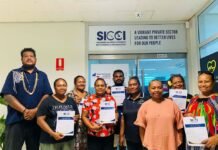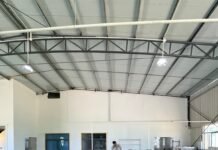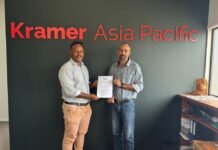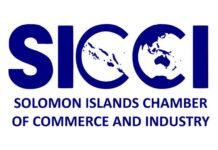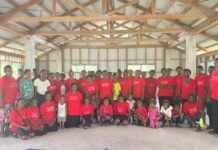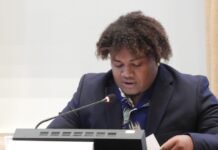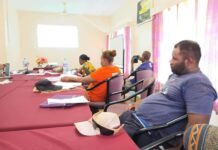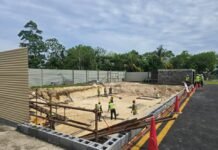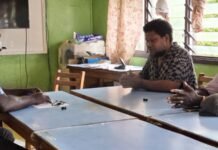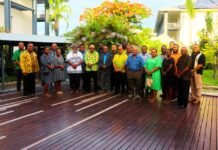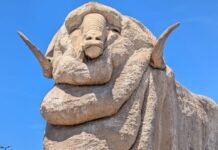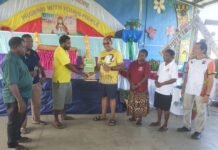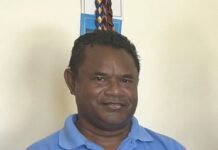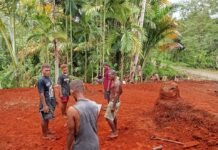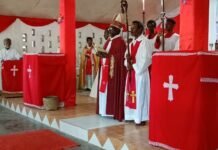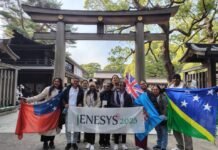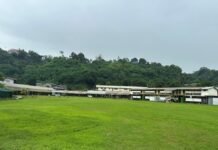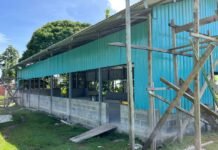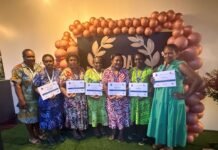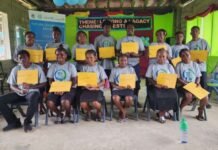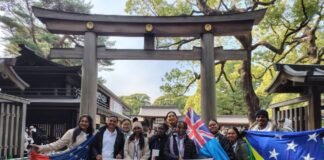
MINISTER of Education and Human Resources Development (MEHRD), Hon. Lanelle Olandrea Tanangada on Wednesday 13th September, 2023 signed a Memorandum of Agreement with the University of Goroka to establish the University of Goroka Pacific Open Campus in Honiara.
Dr Mathew Landu, Pro Vice Chancellor Academic, Research and Innovation of the University of Goroka signed the agreement on behalf of the University.
Witnessing the signing ceremony were Mr Robin Basanuec, member of Council of the University of Goroka who represented the Vice Chancellor, Dr Teng Waninga, who was unable to attend the signing ceremony due to commitment at the University, Executive Director of the Institute of Distance Flexible Learning, Mr. Kenson Rui, Project Technical Officer, Mr. Kingston Kaman, Director Hela Study Centre, Mr. Thomas Kopari, Papua New Guinea High Commissioner to Solomon Islands, H.E Moses Kaul and Dr Franco Rodie, Permanent Secretary of MEHRD.
Speaking at the signing ceremony, Minister Tanangada said the agreement symbolizes a partnership that will lead to many new joint initiatives in producing new synergies and academic value for the ministry and the University of Goroka.
The signing ceremony marked another important milestone for both PNG and SI in the area of tertiary education and a testament to the long-standing and progressive bilateral relationship and cooperation between the two countries.
With the agreement signed, Hon. Tanangada is confident and believes that the country can increase access to quality tertiary education for its citizens.
“I believe both the University of Goroka and my ministry can leverage our respective strengths – to meet the labour market with a skilled workforce, whether it be in the education sector, public or private sector.
“I envisage that the students who may pursue postgraduate programmes would engage in research as part of their course work or dissertation,” Minister Tanangada stated.
She also said that “the agreement proposes a model of how academic collaboration should be – between her Ministry and the Universities that wish to establish their campuses in the country in the not too distant future.”
Under the agreement, Solomon Islands citizens can access tertiary education through the University of Goroka Pacific Open Campus in Honiara, especially in the area of teacher education and school leadership. Opportunities are also open to candidates who wish to study through the University of Goroka Pacific Open Campus by self-sponsorship or applying for SIG funded scholarships.
The agreement signed was made possible through a bilateral development agreement between the government of Papua New Guinea and Solomon Islands in recognition of the need to extend tertiary education to the people of Solomon Islands.
Honourable Lanelle said “PNG has long been a trusted neighbour and a genuine development partner of Solomon Islands since Independence by opening its doors to Solomon Islands citizens to its tertiary education institution who have benefited in terms of workforce skills required in the country.”
She said a good number of teachers were trained at the then Goroka Teachers College – before and after the country gained political independence from Great Britain.
“These teachers attained their Diplomas in Teaching in various disciplines such as science, mathematics, social science, physical education, home economics, industrial arts, and creative arts.
“These trained and certified teachers replaced the expatriate teachers after they successfully completed their studies and returned to the Solomon Islands mid-1980s and 1990s.
“Based on their performance, teacher graduates from the Goroka Teachers College were highly regarded, not only because they had developed their teaching skills and competencies, but also because they were prepared well for their teaching roles.
“These teachers were also known for their professionalism, creativity and, most importantly, commitment and love for the students’ success,” she said.
Hon. Tanangada also emphasises in the context of tertiary education in the country, two critical goals in the current reform agenda of her ministry, which are to improve equitable access to quality tertiary education and to build partnerships and close collaboration with universities that are interested to establish their campuses in the country.
“Our country has a relatively low rate of participation in higher education and so it has been our concerted effort to expand access by increasing the number of opportunities available through our Government funded scholarship program.
“We have a growing youth population that we must cater for and who demand tertiary education and qualifications.
“We believe it will tremendously help our country to produce the skilled workforce required by our industries, including public and private sectors.
“We hold the view that well-educated citizens can and will allow us to form the foundation of social equity, cohesion and successful participation in the global knowledge economy.
“Hence, we strive to set goals to increase the share of the population with higher education and/or broaden access to higher education for individuals that are under-represented.”






